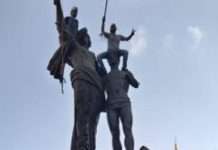Two Israeli soldiers killed, 7 injured by Hizballah fire from Mt. Dov on unarmored IDF command vehicle. The IDF hit back
DEBKAfile Exclusive Analysis January 28, 2015,
The IDF spokesman disclosed that an officer and a soldier were killed and 7 injured in coordinated Hizballah rocket and mortar attacks from Mt. Dov (Shabaa Farms) on an Israeli command patrol vehicle near the border Wednesday, Jan. 28. debkafile: The vehicle was not armored.
Israel deployed artillery and aircraft to hit back at Hizballah and allied targets in South Lebanon and a broad military clash ensued lasting more than 90 minutes. The Iranian proxy claimed the attack as retaliation for the Jan. 18 attack which killed 6 of its fighters and an Iranian general.
A broad military clash between Iran-backed Hizballah and Israel erupted on Israel’s northern borders. Residents of Metula and other border locations were ordered to stay indoors and keep their doors and windows shut; tourists warned to stay out of the region and road traffic halted. Israeli massed military strength in border areas after moving figures on the Lebanese side were feared preparing to cross the border for terrorist attacks on abductions under cover of fire.
Prime Minister Binyamin Netanyahum on his way to an urgent, top-level security conference warned: “My advice is not to test us!” debkafile: Israel is determined to ward off any Iranian and Hizballah plans for a war of attrition..
Mt. Dov (Shabaa Farms) is a small mountainous strip of land disputed between Israel and Hizballah at the intersection of the Lebanese-Syrian-Israeli borders nx adjacent to the Golan in the north. It is about 11km long and 2.5 km wide.
debkafile reported Wednesday morning:
Expanding its responses to missile fire from the Syrian Golan, Israeli fighter jets went into action Tuesday night, Jan. 27, as warning sirens blared for a second rocket attack in the northern Golan villages of Odem, Al-Rom. Buq’ata, Majd el-Shams, Masaada. Neve Ativ, Nimrod and Ain Kanya. The search for rocket fragments began at first light Wednesday and continues.
Israeli jets targeted the Syrian artillery position in the Quneitra region, shelled by Israel Tuesday afternoon after a four-rocket volley was directed at northern Golan and the adjoining Hermon ski resort without causing casualties. This Quneitra position is manned by the Syrian army’s 90th Brigade with the Syrian Popular Army militiamen deployed nearby. That militia is under construction by Iran as a Syrian facsimile of its Revolutionary Guards.
debkafile’s military sources report that Israel was standing by for a repeat of the first rocket attack by pro-Iranian elements on the Golan, including Hizballah – especially after the dire warnings of retaliation issued earlier Tuesday by Tehran – and so the Israeli air force was ready to react fast. The way is now open for both sides to escalate – or draw back.
debkafile reported earlier that Tehran had Tuesday adopted two synchronous courses for getting back at Israel for the Jan. 18 air strike near Quneitra which killed an Iranian general and six Hizballah officers: Iraqi Shiite militiamen posted on the Syrian Golan along with Hizballah fighters sent four rockets winging towards Mt. Hermon while some 1,600 people were skiing on its slopes: Two landed and exploded on the Israel side of the demarcation line – one near the skiers and the other outside Kibbutz Merom Hagolan. None caused casualties or damage.
Israeli forces stationed along the Syrian and Lebanese borders went on top readiness, a level still in force. Overhead, Israeli planes and other aerial vehicles were on 24-hour patrol.
In Tehran, two high Iranian officials Tuesday warned Israel to await retaliation.
Dep. Foreign Minister Hossein Amirabdollahian said: “We told the Americans that the leaders of the Zionist regime should await the consequences of their act,” adding, “Israel crossed our red lines.”
He spoke at a commemoration ceremony for the Iranian general Mohammad Ali Allah Dadi who was slain on the Syrian Golan a week ago.
In this warning, the Iranian official introduced two new features: Tehran has never before set red lines for Israeli military action; neither have the Iranians ever admitted to relaying a warning to Israel through Washington – at least not in public.
The Islamic Republic was saying in effect that it is not only acting in concert with the Obama administration over a nuclear accord, but the two powers will also be aligned against any potential Israel military action against Iran that is intended to upset the nuclear accord unfolding between Washington and Tehran.
In Washington, State Department spokeswoman Jen Psaki declined to comment on “private diplomatic contacts with Iran” beyond saying that no threat was delivered to Israel in the latest round of nuclear talks.
“We absolutely condemn any such threats that come in any form,” Psaki told reporters.
Then, Tuesday night, The Revolutionary Guards’ acting commander, Gen. Hossein Salami, vowed that Iran would “retaliate soon.”
debkafile’s military sources do not rule out Iranian and Iraqi Shiite militias posted to Syria, together with Hizballah, possibly escalating attacks on Israel from the Syrian Golan in the days to come. Such attacks are unlikely at this stage to form a continuous campaign but would rather be sporadic, their purpose being to maintain a high level of military tension and keep Israel on constant alert and on edge.
On the diplomatic front, Tehran will continue the effort disclosed Tuesday to drag the US and the Obama administration into involvement in the ongoing crisis, to make sure Israel’s hands are tied against major responses to its harassments.
So Jen Psaki had every reason to express great concern about the future of the ceasefire along Israel’s borders with Syria.


















